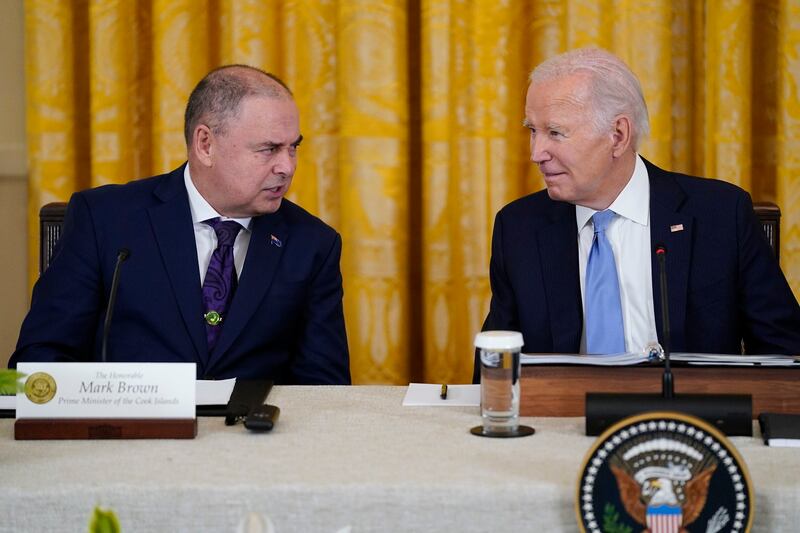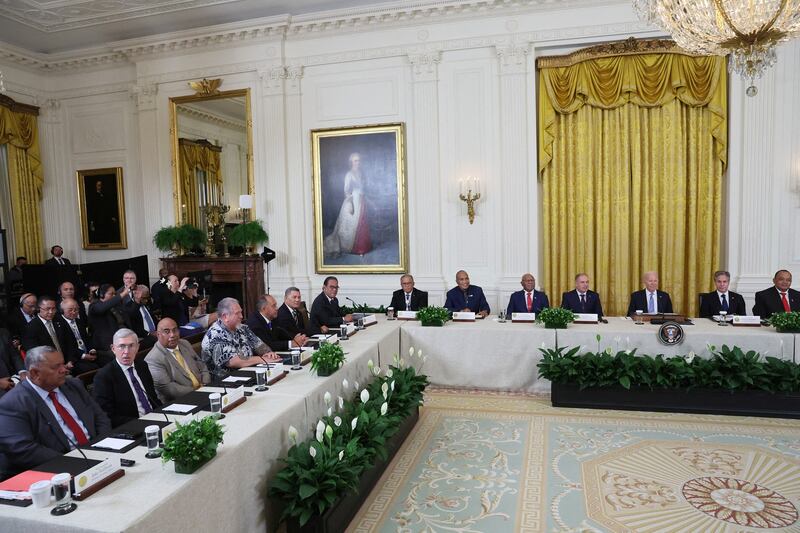Updated Sept. 27, 2023, 11:46 p.m. ET.
President Joe Biden called on Congress to approve an additional US$200 million of assistance for Pacific island nations, the latest move in his administration’s push to counter Chinese influence in a region crucial to U.S. defense.
A slew of U.S. initiatives, largely conditional on Congressional approval, were announced Monday at the second U.S.-Pacific islands leaders summit in Washington in a year. The largest items were US$64 million of development aid and US$40 million for infrastructure.
The summit, which brought together 16 Pacific island nations as well as Australia and New Zealand, was not attended by Solomon Islands Prime Minister Manasseh Sogavare, who has pulled his country close to China since severing ties with Taiwan in 2019. Three days before the summit, Sogavare praised China’s infrastructure projects in the Solomon Islands in his address to the United Nations General Assembly in New York.
“The U.S. should focus on coordinating its activities in the Pacific with established partners such as Australia, especially in Solomon Islands and Papua New Guinea,” said Mihai Sora, a Pacific analyst at the Lowy Institute, a think tank in Canberra, Australia.
“The U.S. embassy in [Solomon Islands capital] Honiara appears to be making very little headway on its own with Prime Minister Sogavare, who time and again demonstrates his intent to privilege his relations with China,” said Sora, a former Australian diplomat.
Speaking alongside the Pacific island leaders after a morning meeting and a group photo at the White House, Biden said the United States was a committed friend and shared their concerns about the sea-level rise projected to occur this century.
“We hear your warnings of a rising sea, that it poses an existential threat to your nations,” Biden said, promising US$20 million for adaptation measures. “We hear your calls for reassurance that you never, never, never will lose your statehood, or membership with the U.N., as the result of a climate crisis.”

The United States also recognized Niue and the Cook Islands, two self-governing states in free association with New Zealand that have growing ties with China.
U.S. interest in Pacific island nations was galvanized in early 2022 after Beijing and the Solomon Islands signed a security pact that the U.S. and allies such as Australia fear could lead to a Chinese military presence in the region.
Since then the U.S. has agreed to increase its financial and economic assistance for Federated States of Micronesia, Marshall Islands and Palau – three North Pacific countries that delegate their defense to Washington under longstanding compacts of free association. Subject to budget appropriations, the three nations would receive more than U.S. $7 billion over 20 years.
The first Pacific Islands-U.S. summit in September last year announced plans for more than U.S. $800 million in assistance to island nations over a decade. The figure included nearly tripling the payments tied to a tuna fishing treaty with Pacific nations to a total of U.S. $600 million between 2023 and 2033.
A State Department spokesperson told RFA affiliated news service BenarNews that the economic assistance agreement for the tuna payments went into effect this month and the first annual payment of U.S. $60 million would occur in mid-2024.
Cook Islands Prime Minister Mark Brown, who also is chairman of the 18-nation Pacific Islands Forum, said he appreciated Biden’s proposals, but also cautioned that relations “cannot be restricted to annual summits.”
“It must be a years-long effort, working to an agreed plan of action and supported by requisite resources to deliver transformative actions,” Brown said. “Our gathering today is our joint commitment to elevating our efforts.”

It is not assured that Congress will pass all the Pacific spending measures proposed by Biden’s administration in a timely fashion or approve them at all.
“It is unfortunate that President Biden has struggled to unlock most of the funding for Pacific initiatives announced over the last 12 months or so – including from the last U.S.-Pacific summit,” said Sora.
“This has put the U.S. in an awkward position. There is little to gain from the U.S. making new announcements until it starts to visibly deliver on its own commitments.”
Biden’s latest proposals also come as the Congress is deadlocked in last-minute talks to keep the U.S. government open past Saturday, underlining the possible gap between what political leaders promise and what the machinery of the U.S. government delivers. So far the Republican-led House has been unable to pass a budget even with heavy spending cuts as hardliners push for more penny-pinching.
That has left the Biden administration searching for other ways to woo the Pacific leaders, including a charm offensive taking advantage of the fact they were in New York for the annual U.N. General Assembly.
On Sunday, Pacific leaders were assigned a special Amtrak train to travel from New York to Washington, with a side-trip to Baltimore.
In Baltimore, they were feted on the field during the Baltimore Ravens 22-19 loss to the Indianapolis Colts, before boarding a Coast Guard cutter to meet with Coast Guard Commandant Linda Fagan and discuss U.S. efforts to help counter illegal fishing in the Pacific.
BenarNews is an RFA-affiliated news organization.
This story was updated to add quotes and details throughout.

